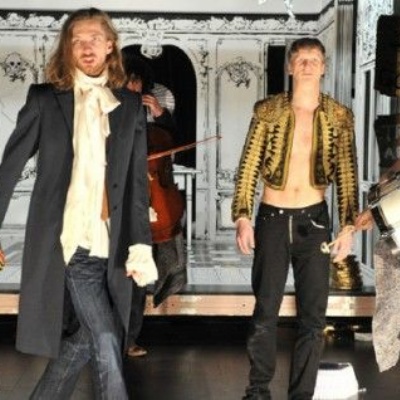The Arts and the Power of Imagination

Vincent van der Valk (The Netherlands, @Li Po Chun UWC of Hong Kong 2002-2004) is an actor currently working in Berlin. It was during his time at UWC that he discovered acting as a powerful form of communication, which would allow him to engage with people on topics that matter to him. Here is his story.
“To me, the fascinating thing about being an actor is the variety of worlds I get to live in. I have played the cruelest of Roman emperors in ‘Caligula’, as well as the doubtful and maybe even cowardly Louis Ironson in ‘Angels in America’. When I’m not portraying a character, I am exploring ideas on stage in a less classical structure, like I am doing now in Berlin with Andcompany&Co. We are currently working on a piece titled “Not my revolution if…: The stories of Angie O”, which deals with the theme of revolting against inequalities in the world. Then there are also moments when I am not on stage and I write. In those moments I have the privilege of exploring my own views on life and create new texts.
The reason I am so passionate about theatre and film - and the arts in general - is my strong belief in the power of our imagination. Our imagination influences our perception. And it can influence our thoughts too. As artists, we have the power of getting into people’s minds and stir things up, bring comfort or change views. To try and broaden people’s view on life, whether by trying to arouse compassion for certain characters or challenging ideas on our society, to me it is an honorable task.
Achieving this is also one of the hardest things to do. As an actor, you won’t always be in productions that shake up the audience. And even if you are, you won’t always be able to reach the level of performance you strive for every night. And it’s the same when you write: however passionate you are about something, there’s no guarantee it will turn into something good. And that is challenging. For me the paradox of working in the arts is that when it’s powerful it’s magic, but when it’s not powerful it’s not even relevant.
As a teenager I was quite outspoken during my UWC-period. Whether it was about protesting against the war in Iraq or criticizing the school’s emphasis on academics, I didn’t hesitate to organize gatherings to discuss issues that I thought were important. And even though my intentions were good, my actions were often without results or even misunderstood. My speeches were unclear, I spoke too emotionally and my preoccupation with complex themes such as ‘fighting injustice’, ‘making the most of this UWC-experience’ and ‘academics vs. real life’ prevented me from taking real action and come with solutions. It wasn’t until I decided to create a theatre-play along with my Icelandic co-year that I realized that no matter how hard I would try, I would never be able to express myself fully in a political or diplomatic context. I remember performing in front of the audience at school and feeling that I had finally found a way to talk to people.
When I became fully aware of the fact that I can contribute most by doing what I do best, I embraced the theatre as my ‘home’ and started moving towards a life as a professional actor.
UWC influenced me a lot in being as open minded and considerate as possible, and maybe this is also what allows me to be active in such a wide variety of fields, from classical to experimental theatre, from film to television, from acting to writing”.
Jury for Arlecchino (price for best supporting actor)
“Leaving your lover, just after he’s been told that he has a deadly disease - it is not directly an act that arouses your sympathy. Vincent van der Valk introduces a character that is not easy to follow. Compassion and disgust alternate; as a viewer you try to understand Louis' motives, but Van der Valk does not let you in easily. He can be charming but also cunning, he has something lingering in his acting and then suddenly becomes quite sharp. Steadily he 'builds' up his character, a fascinating androgynous appearance that flutters between malicious cowardice and sincere love. He thus ultimately gives an incredibly penetrating interpretation of this special role, one that stays with you for a long time.”
NRC-Handelsblad (newpaper) about ‘Toen geluk en ongeluk zich in elkaar vergisten” (the first play I wrote)
“A slightly absurd, poetic text by Vincent van der Valk about the (im) possibility of real contact, the importance of art, and how life and art, reality and fiction relate to each other.
It’s impressive how Van der Valk keeps seducing the specatator to go along with different views. Time and time again you think: yes, that’s a good point too. Until you conclude: and yet I would not want to live like that. You can also interpret the title like this: Happiness is not decided in one particular way of life, though one often thinks it is.”
